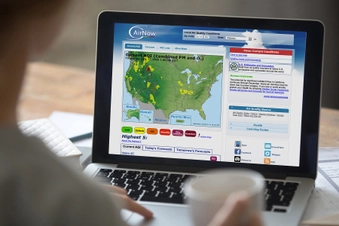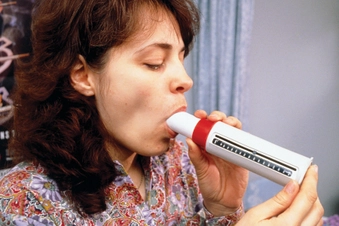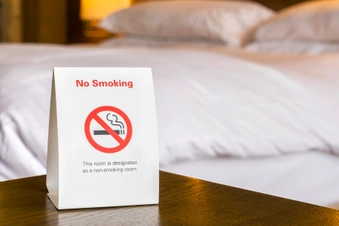Everyday Tips to Ease Eosinophilic Asthma Symptoms

Jot It Down
The more info you have about your condition and what might affect it, the better. Keep a record of foods you eat, how much rest you get, medications you take, and when you have attacks.

Pinpoint Triggers
Once you have a couple weeks of a diary down, you can look for attack triggers. Look for:
- Respiratory infections
- Acid reflux
- Foods you ate before an attack
- Medications you may have taken
- Air quality
- Exposure to animals
- Exercise patterns
- Odors
Identify the likely culprits so that you can take action to avoid them when possible.

Get Vaccinated
Asthma attacks make your airways swell and fill with mucus. So do infections like the flu, whooping cough, and pneumonia. The combo of the two can cause serious problems with your health. Vaccines for these viruses make your risk of infection much less.

Be Careful With Pain Relief
Have a headache? Think before you reach for that bottle of aspirin. This type of asthma is more likely to make you highly sensitive to the effects of non-steroidal anti-inflammatory drugs (NSAIDs). This includes common pain relievers like aspirin, ibuprofen, and naproxen. These drugs can inflame your airways and cause serious growths in the lining of your nose called nasal polyps. A non-NSAID pain medicine like acetaminophen is safer.

Keep an Eye on Allergens
Allergens are less likely to be triggers for people with eosinophilic asthma than other types. But notice if your symptoms get worse around things that can cause allergies, like mold, dust mites, and pet dander. Use your air conditioner at home to keep triggers like these away. Vacuum and dust your house regularly, and use a HEPA filter on your vacuum cleaner. If you have a pet with fur, don’t allow them into your bedroom.

Make Fitness a Priority
You need strong lungs and a healthy heart to help you deal with your asthma. Get regular exercise to strengthen your defenses. If you carry too much weight on your body, that can also make asthma symptoms worse. Physical activity can help you stay at a healthy weight.

Don’t Smoke
Smoking isn’t good for anyone, but if you have eosinophilic asthma, it’s even worse. Irritants in cigarette smoke easily trigger symptoms. They also cause your airways to make more mucus. This raises your chances of having a respiratory illness. Secondhand smoke may actually be worse for you than smoking yourself, so it’s not a good idea to hang around others who smoke, either.

Track Air Quality
Several apps and websites will report on the air quality index each day. An ozone level between 51 and 100 can make asthma symptoms worse. Anything above that is dangerous for people with asthma. If you have to be out and about, drive with your windows up or wear a mask. Try to go out in the evening and morning when air quality is at its best.

Stay on Top of Your Care
Your meds work best when you take them exactly how your doctor directs. Follow your care plan for the tightest control of your asthma and fewest asthma episodes. Use your peak flow meter when your doctor asks, so you have all the info you need to correct your treatments as needed.

Avoid Scented Products
Cleaning supplies, air fresheners, perfumes, laundry detergent -- any product with a scent can trigger an attack. Check the ingredients of personal products to see if they have fragrance before you buy them. Opt for fragrance-free instead.

Travel Smart
Don’t leave home without your emergency meds. On a trip, be sure you’ve got your daily meds, too. Call ahead to hotels to be sure your room is smoke-free. Pack a pillowcase from home. Bring a mask along in case you’re in an area with secondhand smoke or other irritants. And carry hand sanitizer and wet wipes to make it less likely that you’ll come into contact with a trigger.

Talk to Your Doctor
The key to fewer episodes is to take control of your condition. Stay in close touch with your doctor, especially if your asthma changes or you’re having attacks. Your doctor can make tweaks to your care so you manage your asthma instead of letting it manage you.
Show Sources
IMAGES PROVIDED BY:
1) LeoPatrizi / Getty Images
2) Clockwise from top left: decade3d / Getty Images, ChrisChrisW / Getty Images, bit245 / Getty Images, smartstock / Thinkstock, bo1982 / Getty Images
3) mmg1design / Getty Images
4) Image Source / Getty Images
5) Kira-Yan / Getty Images
6) moodboard / Getty Images
7) sercansamanci / Thinkstock
8) fizkes / Thinkstock
9) DAMIEN LOVEGROVE / Science Source
10) kasto80 / Getty Images
11) ymgerman / Getty Images
12) Fuse / Thinkstock
SOURCES:
American Partnership for Eosinophilic Disorders: “Eosinophilic Asthma.”
American Lung Association: “Reduce Asthma Triggers.”
Asthma and Allergy Foundation of America: “Asthma Increases Risk of Certain Preventable Diseases,” “Pet Allergy: Are You Allergic to Dogs or Cats?” “Traveling with Asthma and Allergies.”
Mayo Clinic: “Asthma,” “Asthma attack.”
Cleveland Clinic: “Smoking & Asthma.”
American Academy of Allergy, Asthma & Immunology: “Your Questions Answered On Air Pollution And Asthma.”
Air Quality, Atmosphere & Health: “Fragranced consumer products: effects on asthmatics.”
Current Allergy and Asthma Reports: “Hypersensitivity to Aspirin and other NSAIDs: Diagnostic Approach in Patients with Chronic Rhinosinusitis.”
American Journal Of Therapeutics: “Recommending analgesics for people with asthma.”